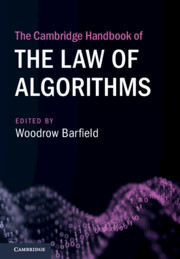Book contents
- The Cambridge Handbook of the Law of Algorithms
- The Cambridge Handbook of the Law of Algorithms
- Copyright page
- Contents
- Figures
- Tables
- Notes on Contributors
- Foreword
- Preface
- Acknowledgements
- Abbreviations
- Part I Introduction and Setting the Stage for a Law of Algorithms
- 1 An Introduction to Law and Algorithms
- 2 The Opinion of Machines
- 3 Private Accountability in an Age of Artificial Intelligence
- 4 Algorithmic Legitimacy
- 5 Understanding Transparency in Algorithmic Accountability
- Part II Business, Regulations, and Decision-Making with Algorithms
- Part III Intellectual Property and Algorithms
- Part IV Criminal Law, Tort Issues, and Algorithms
- Part V Constitutional Law, Human Rights, and Algorithms
- Part VI Applications and Future Directions of Law and Algorithms
- Index
2 - The Opinion of Machines
from Part I - Introduction and Setting the Stage for a Law of Algorithms
Published online by Cambridge University Press: 19 October 2020
- The Cambridge Handbook of the Law of Algorithms
- The Cambridge Handbook of the Law of Algorithms
- Copyright page
- Contents
- Figures
- Tables
- Notes on Contributors
- Foreword
- Preface
- Acknowledgements
- Abbreviations
- Part I Introduction and Setting the Stage for a Law of Algorithms
- 1 An Introduction to Law and Algorithms
- 2 The Opinion of Machines
- 3 Private Accountability in an Age of Artificial Intelligence
- 4 Algorithmic Legitimacy
- 5 Understanding Transparency in Algorithmic Accountability
- Part II Business, Regulations, and Decision-Making with Algorithms
- Part III Intellectual Property and Algorithms
- Part IV Criminal Law, Tort Issues, and Algorithms
- Part V Constitutional Law, Human Rights, and Algorithms
- Part VI Applications and Future Directions of Law and Algorithms
- Index
Summary
A specific software architecture, neural networks, not only takes advantage of the virtually perfect recollection and much faster processing speeds of any software, but also teaches itself and attains skills no human could directly program. We rely on these neural networks for medical diagnoses, financial decisions, weather forecasting, and many other crucial real-world tasks. In 2016, a program named AlphaGo beat the top-rated human player of the game of Go.3 Only a few years ago, this had been considered impossible.4 High-level Go requires remarkable skills, not just of calculation, at which computers obviously excel, but, more critically, of judgment, intuition, pattern recognition, and the weighing of ineffable considerations such as positional balance.5 These skills cannot be directly programmed. Instead, AlphaGo’s neural network6 trained itself with many thousands and, later, millions of games – far more than any individual human could ever play7 – and now routinely beats all human challengers.8 Because it learns and concomitantly modifies itself in response to experience, such a network is termed adaptive.9
- Type
- Chapter
- Information
- The Cambridge Handbook of the Law of Algorithms , pp. 16 - 46Publisher: Cambridge University PressPrint publication year: 2020



